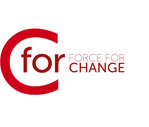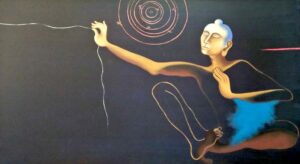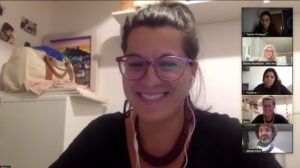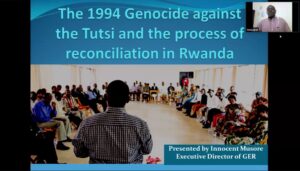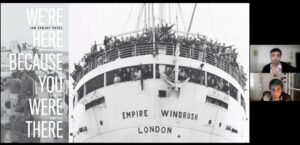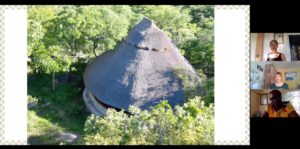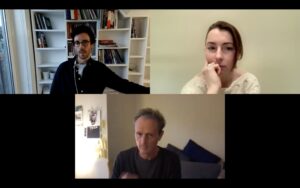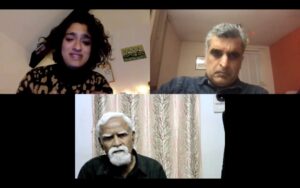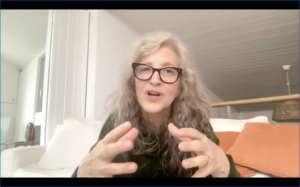‘FACILITATING OUR FUTURE’ SERIES
‘The Thread’ by Arpana Caur
The ‘Facilitating Our Future’ Series gave all of us who attended a rare opportunity to learn from the knowledge and experience of the wonderful session leaders and participants from different parts of the world.
Some participants said it gave them a sense of freedom to learn about dynamics of collective trauma, our awareness and accountability, and the possibility of transforming the polarisations that we have inherited, in order to interrupt cycles of violence and find pathways to our future.
We witnessed together, learning, and engaging with the extensive information, personal experience, and insights shared by the session leaders, feeling how we are deeply interconnected.
It is in the continued spirit of learning from one another that we gather and share a summary of the series here.
This is also an opportunity, to show our appreciation and gratitude to the session leaders – Neus Andreus Monsch, Innocent Musore, Raggi Kotak, Sheila Menon, Maaianne Knuth, Mvuse Huni, Undine Whande, Paula Boyle, Paul Callery, Padraig Cotter, Jay Revar, Shilpa Shah, Anup Karia and Arlene Audergon. Thank you to all the participants for what you contributed and your presence. We are touched and humbled to have had this opportunity to learn together. Thanks to Priyanka Tiwari, Taaiba Khawaja and Tajana Vlaisavljevic for your dedicated tech support and coordination. And it’s a moment to thank Jean-Claude Audergon for his vision and integrity, side by side with Arlene, in creating this Series – one of the last things he was working on before he passed. His presence was felt throughout.
Opening and introduction to the Series: Arlene Audergon
In Arlene’s introduction, she welcomed everyone to the Series, and touched on essential themes that will recur during the upcoming sessions – our personal and collective trauma, and our awareness and accountability to one another. We looked at the dynamics of collective trauma, our tendency to disassociate and separate from one another. And the possibility of growing in our personal and collective awareness, to awaken from the replay of our collective nightmare, and facilitate our future.
Arlene introduced Neus, our first session leader.
Session 1 – Neus Andreus Monsch:
‘Catalonia and Spain – Processing the polarisations of History, from colonialism to Franco to modern day’
Neus thanking the group for their presence
Neus Andreus Monsch gave a powerful presentation about the tyranny of Franco; ‘the pact of forgetting’; polarizations concerning Catalonia and Spain; and how grappling with Spain’s collective trauma and open questions of accountability link to the need for Spain to grapple with its colonial history and legacy.
Neus described and made palpable how history is not in the past – but rather history is inside of us – perpetuated in our societies and in our families, and in each of us personally.
She shared her personal journey and touched on those moments when you discover that what you thought was just your personal behaviour or problem is linked to family and community-wide trauma. It was inspiring to think about how our personal awareness can bring the energy and freedom to be able to facilitate needed processes of accountability.
Neus spoke about the current polarisation between Catalonia and Spain, and how this relates to inherited collective trauma, and the ‘pact of forgetting’, an official agreement of silence and impunity, in respect to all who were killed, disappeared and tortured under Franco’s rule. She also touched on the attempts in more recent years to locate mass graves and recover memory.
‘Collective trauma shapes the present and history is not in the past.’
Neus brought an important perspective that facilitating awareness of the ongoing impact of history, and the dynamics of collective trauma and accountability within Spain, will also support Spain to grapple with accountability for its colonial history and ongoing legacy.
Speaking about her own relationship to ‘transgenerational’ trauma, Neus passed on a sense of how our personal awareness can bring the energy and freedom needed to facilitate processes of accountability within us, and around us.
‘The Silence of others’ (2018) – award-winning film on the struggle during Franco’s dictatorship and later the ‘pact of forgetting’– link
Information about the film – link
Relationship between Catalonia and Spain: The history that led to and the Catalan fight for independence in video – link
Catalonia and Spain processing its history: Thread on the exhumation of Franco “Why Spain wants to exhume Franco” – link
Session 2 – Innocent Musore:
‘Rwanda and the Great Lakes – the 1994 genocide against Tutsi, and processes of reconciliation’
Innocent introducing his session on Rwanda and the Great Lakes
Innocent Musore, Executive Director of GER (Global Initiative for Environment and Reconciliation), Kigali, led a very important session about the 1994 Genocide against Tutsi, including the history leading up to the Genocide, its consequences, and the current collective efforts in Rwandan society to reconcile and create a future for all Rwandans.
Innocent’s presentation touched on the profound impact of the work of GER in partnership with CFOR, and in cooperation with the NURC National Unity and Reconciliation Commission. This has involved gathering and facilitating community in deeply transformational forum interactions to work with their traumatic history, honour the wisdom and direction in community and prevent future conflict. Innocent also highlighted how rare and important it is for a country to have the political will to reconcile, and the clear purpose to find a path ahead together as ‘Rwandans’. And how this political will needs support by way of having facilitated dialogue about the most difficult and painful topics and hotspots.
Innocent invited us to also reflect on our global role and responsibility. He pointed to the lack of intervention on the part of the international community when the genocide could have readily been stopped. He also pointed clearly to the need for us to grapple with Europe’s colonial history – especially the creation of ‘ethnic’ divisions among Hutu and Tutsi, in what had been a socio-economic system – resulting in polarisations that were then manipulated in later decades to orchestrate the genocide.
At the end of the session, Innocent shared a beautiful video clip of a traditional dance by Rwanda’s National Ballet ‘Urukerereza’.
Traditional dance by Rwanda’s National Ballet ‘Urukerereza’ – link
A 3-minute video about GER and CFOR’s work in Rwanda – link
‘Stopping the World: Worldwork in Rwanda’ short film series: ‘The Interpreters Experience’ – link
Stopping the World: Worldwork in Rwanda ‘Perpetrators and Youth’ – link
Session 3 – Raggi Kotak and Sheila Menon:
‘History and Legacy of UK colonialism in relation to issues of racism, asylum and migration’
Raggi and Sheila shared the story of Windrush as an example of how UK’s formation of the commonwealth led not only to increased immigration but also to increased discrimination.
Raggi Kotak and Sheila Menon’s session touched on far-reaching themes, personal and important to all of us. They spoke about the history and legacy of UK colonialism in relation to issues of racism, asylum and migration.
Raggi and Sheila spoke about UK’s colonial history across the world, as well as neo-colonialism, in respect to economics, exploitation, human rights violations and climate change. They touched on how today’s capitalist world is built on a foundation of racist colonial domination, in which the UK played a leading role – the legacies of which continue to perpetuate inequality, oppression and exploitation.
Raggi and Sheila explored dynamics of racism in relation to issues of asylum, and migration as shaped by the history and legacy of UK colonialism. They described how the UK’s formation of the Commonwealth led not only to increased immigration, but to increased racism, and to attitudes of disdain and discrimination towards immigrants – even when they’d been invited and given legal status, illustrated in the example of Windrush.
‘We’re here because you were there’ (Ian Sanjay Patel)
Raggi and Sheila also spoke about dynamics of internalised racism among migrant communities and shared some of their own very personal experiences of racism. Participants were given opportunities to reflect on internalised colonial attitudes, whether due to unconscious privilege, or internalised oppression.
7 min video by Valerie Kaur on Revolutionary Love – how educators can create communities – forces of love and care for justice in the world– link
‘Black Liberation and Black Joy, a statement of solidarity by Wretched of the Earth’ – link as a collective demanding climate justice.
‘Let Them Drown – The Violence of Othering in a Warming World’ Naomi Klein – link
Session 4 – Maaianne Knuth, Mvuselelo Huni, and Undine Whande
Gateway – A consortium of 3 organisations, Kunfunda, Orap and Trust Africa
‘Zimbabwe – Processing History, and the Fabric of Community’
Maaianne, Mvuse and Undine inviting us into the concept of ‘KUFUNDA’ as the centre of community and a place of learning
As Maaianne Knuth, Mvuse Huni and Undine Whande opened the session, they welcomed us by inviting participants to ‘call in’ where we each call ‘home’, including our wholeness, complexity, and diversity. Throughout the presentation, they honoured the wisdom, spirit, and capacity in community, to stop cycles of violence and facilitate the future.
Maaianne, Mvuse and Undine explained the meaning of ‘Gateway’ as standing at a juncture between the past and future and emphasised the need for new ways of meeting across historical divisions. They touched not only on historic and current polarisations within Zimbabwe, but especially on the importance of perceiving resilience, vitality, and direction that is arising from inside the community, even during hardship, rather than thinking answers will come from outside.
“Community is the centre of a transformative process and social change”
Tendisai Chiqwedere, Gateway Zimbabwe
Maaianne, Mvuse and Undine shared their most personal hopes and dreams for Zimbabwe’s future, and the gift of ‘seeing and being seen by others’.
Co-creation of ORAP, Kufunda and Trust Africa to enhance social cohesion, healthy communities, and re-weaving of Zimbabwe’s social fabric – link
Gateway Zimbabwe mixtape for 2021 – The link for the Mix Tape
‘Living and surviving in a multiply wounded country’ by Martha Cabrera – how conflict impacts communities and the social fabric
Session 5 – Paula Boyle, Paul Callery and Padraig Cotter:
‘Ireland, Northern Ireland and England’
Paula, Paul and Padraig sharing some of their most personal reflections and feelings
We were welcomed to the session with the greeting ‘Céad Mile Fáilte’ ‘A Hundred Thousand Welcomes’.
Throughout this session, Paula Boyle, Paul Callery, and Padraig Cotter reflected deeply on the painful history of Ireland, and its ongoing impact and legacy – the English oppression, the War of Independence, the Great Famine, the Troubles, the Good Friday agreement, and the current crisis due to Brexit.
Coming from Northern Ireland and Ireland, and living in England, they shared with us some of the deep work they have done personally and as a team.
Their presentation contributed not only to our understanding of the history and current situation in Ireland, but to our understanding about dynamics of personal and collective trauma. They explored what it means to be accountable to one another in deeply personal ways, including grappling with how we dissociate or keep one another at a distance.
Paula, Paul, and Padraig shared both the pain and the inspiration that comes from processing this history, its legacy, and its meaning not only for your personal awareness and relationships with family and community, but for future generations.
The context of Northern Ireland explained – link
Music. ‘Nothing But The Same Old Story’ by Paul Brady – A clear reflection of the experiences of being Irish in London in the 1980s – link
Film. ‘The Wind that Shakes the Barley’ (2006) by Director Ken Loach. Following two brothers fighting against British oppression during the War of Independence (1919–1921) and the Irish Civil War (1922–1923).
Session 6 – Jay Revar, Shilpa Shah, and Anup Karia:
‘Caste issues in India and the Diaspora’
Jay, Shilpa and Anup shared some their deepest personal feelings and experiences about Caste
Jay Revar, Shilpa Shah, and Anup Karia, led a powerful and emotional session about Caste, within India, and in the Diaspora.
Jay’s presentation led us through thousands of years of pain, from the origins of the Caste system, to the continuing despise and violence directed towards the Dalit community, still described as ‘untouchables’. He questioned the persisting silence about Caste within India, and among the international community.
Shilpa spoke to the intersection of caste and gender and the critical role of women in raising awareness and building an anti-caste grassroots movement. She also introduced us to inspiring Dalit women in history.
Anup discussed how important it is for the Hindu Diaspora in the UK to be willing to address and take accountability for caste-based discrimination. He touched on the need for Britain to take accountability for colonialism in India and discrimination within the UK, but not to confound this with the need for India, and the diaspora community to take accountability in respect to Caste discrimination.
All of us participating were deeply moved as the session leaders shared their personal relationship with these themes – the pain and profound commitment that goes into trying to facilitate awareness, understanding and social action.
It became clear that many participants were learning about caste issues for the first time. Although there have been significant advances and contributions challenging the caste system over decades, many participants were shocked to learn about the extreme discrimination, oppressive attitudes and violent practices towards Dalits that persist until today – in India and the Diaspora. And to recognise the silence in the international community. The session leaders inspired us to appreciate the change every one of us can be part of making.
Annihilation of Caste by B. R Ambedkar and Introduction by Arundhati Roy – the Annotated Critical Edition (2016) – link
‘The Doctor and the Saint – race, caste and colonialism’ (presentation by Arundhati Roy on the book above – link
Video by a Caste music collective in Madras, south India- singing about caste inequality and systemic oppression in a unique style – link
Session 7 – Arlene Audergon:
‘Gathering our Learning’
Arlene bringing some of the key themes that were with us throughout the series – dynamics of recurring collective trauma; persisting injustice; dynamics of privilege and accountability and what it means to grow in our personal and collective awareness.
We had an opportunity to recall and connect to what has been meaningful for each of us throughout the Series. We looked at what it means to come from the deepest part of ourselves, as human beings, as we try to even perceive, feel, grapple with, and facilitate the most difficult parts of our human nature – our history, its impact and the ongoing suffering in our world.
Just as our collective trauma is intergenerational, so is the call to action, and to facilitate in these difficult times – we’re standing on the shoulders of our elders and all those who gave their lives so that we can be here now, doing this. Arlene touched on messages from Maya Angelou, Cornel West, John Coltraine and the artwork of Arpana Caur.
A few participants, from all over the world (spotlighted on Zoom) sat together and spoke about what this Series has meant to them, the importance of being able to witness together, and to meet and learn from and with one another. They spoke to central themes for all of us, about hopelessness and hope, and the magnitude of the issues that we face together.
All participants had the opportunity for inner work, to connect to what moved us, what we have learned, and what we are taking forward in our lives and work. With this – the Series came to an end, many expressing their feeling of gratitude and connection to one another.
Maya Angelou and Common link
John Coltraine: A Love Supreme, Pt.1 – Acknowledgement link
